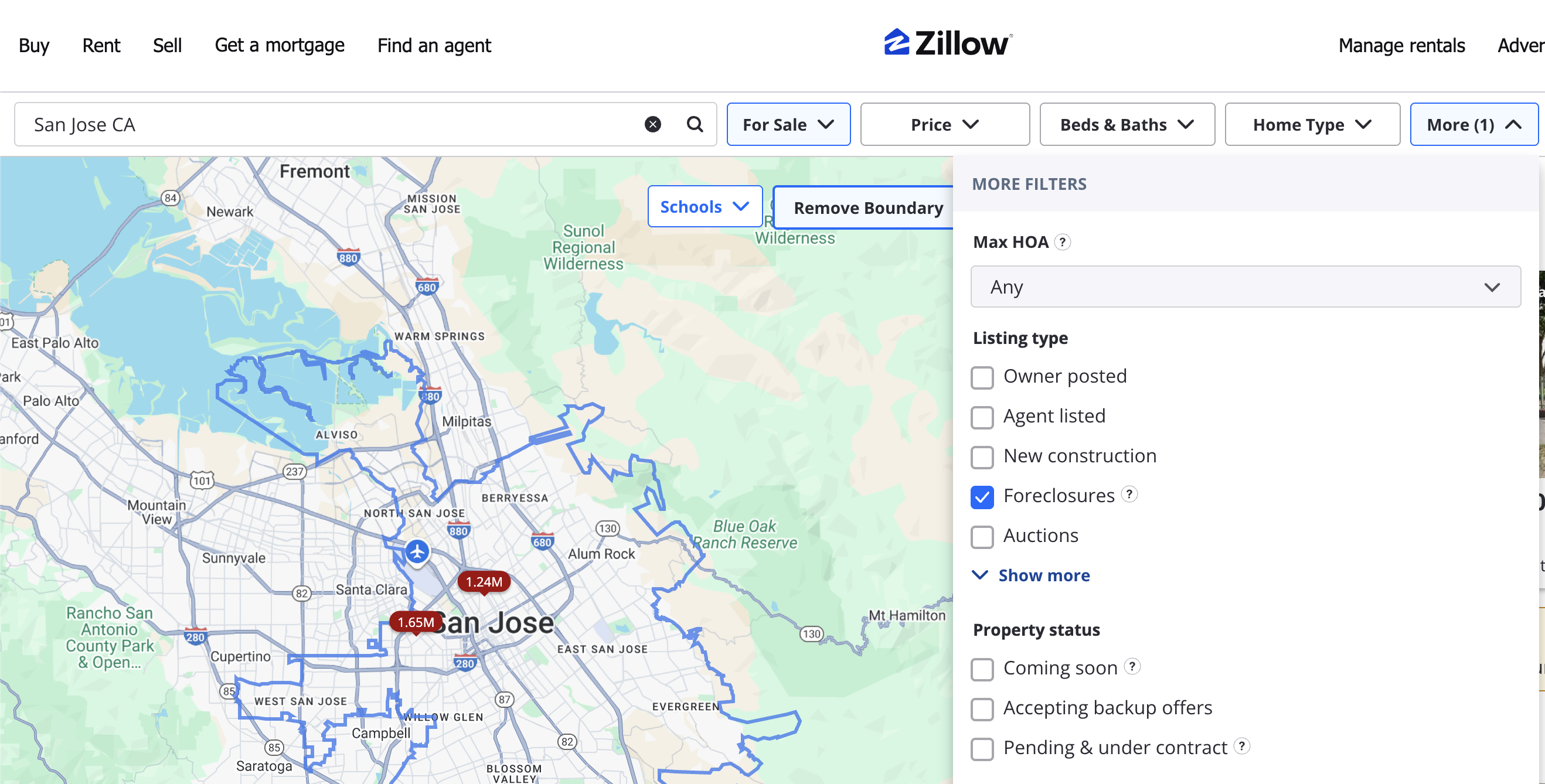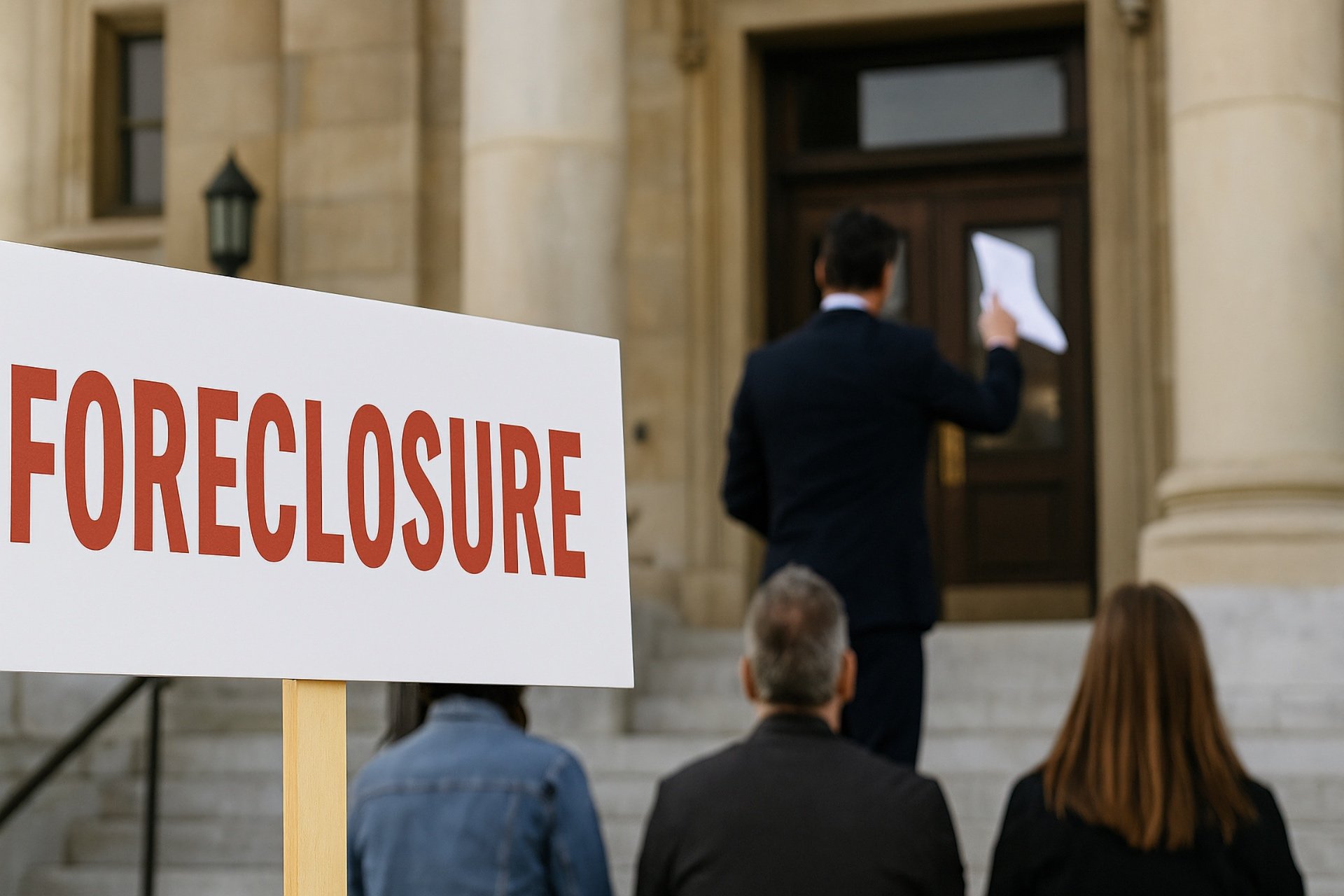Key takeaways
Buying a foreclosure on the courthouse steps is very different from a normal Bay Area home purchase—these sales are typically cash-only, fast, and legally complex, with far less buyer protection.
The biggest risks are the unknowns: you may not be able to fully inspect the property, confirm occupancy, or uncover hidden liens and title issues until after you’ve already committed money.
Successful courthouse-step buyers treat it like a research project first: verify the foreclosure process, understand junior liens, estimate repair costs conservatively, and run realistic resale or rental numbers.
For most buyers, the “deal” only makes sense if you have deep cash reserves, strong risk tolerance, and a clear plan for repairs, eviction (if needed), and title cleanup after the sale.
Summary: Courthouse-step foreclosures can offer upside, but they’re high-risk cash purchases with limited inspection access—so due diligence, lien research, and repair planning matter more than the discount headline.
Foreclosure real estate in the Bay Area is one of my favorite topics! When I first got in to real estate in 2003, it seemed every buyer would ask me, “What about foreclosures? Can I buy one?” So I asked my broker at the time about it, and he explained that there were virtually no foreclosures at the time, because property values had appreciated so quickly that almost everyone had a lot of equity in their homes, so you’d have to be dead, sick, or seriously drug addled to be unable to sell your home as-is on the open market and walk away with tons of cash.
Having said that, the second home that I ever sold was, in fact, a foreclosure property, but it was a bank-owned REO home, which had been foreclosed on at the courthouse steps some months before it came on the market. When most “retail” buyers get a foreclosure home, this is how they do it, since it’s so much easier and safer to buy these homes “retail” than on the courthouse steps.
That particular home was practically a one-off; but by late 2007, I started to see a few more foreclosures being listed for sale on the MLS. I remembered how so many buyers asked about them, so I decided to investigate how I could get into the business of selling foreclosure real estate. My timing was great – I got into the business about a year before most REALTOR®s realized what was happening, and I became the “Foreclosure King” for a few years, selling a couple hundred or so foreclosure homes in the process. So when it comes to foreclosure real estate, I do consider myself something of an authority.
If you’re considering buying a foreclosure at a public auction (often called “on the courthouse steps” or a “trustee sale”), you’re stepping into one of the riskiest corners of real-estate investing. The potential upside (deep discounts) attracts many, but the pitfalls are severe and often underestimated. If you’re active in Santa Cruz, Santa Clara, San Mateo or Monterey counties (or anywhere in California), this guide is for you.
In this article I’ll walk you through exactly how courthouse-step auctions work, what risks you must accept, why many auctions never happen, how to discover upcoming foreclosures in your region. Lastly, I will explore some safer alternatives to chasing the “stepped sale.”
Why Foreclosure Auctions Exist & How They Work in California
In California, many foreclosures are handled non-judicially—meaning the lender or trustee follows a statutory procedure without going to court (unless there is a legal dispute). The basic sequence is:
- A borrower misses mortgage payments, and after some delay the lender records a Notice of Default (NOD) in the county records, opening a window for reinstatement.
- If the default isn’t cured, the lender (or its trustee) records a Notice of Trustee’s Sale (NOTS), which announces the date, time, and location when the property will be auctioned.
- On the scheduled date, the property is publicly auctioned—typically on the county courthouse steps or another public location.
- The highest bidder (if bidding exceeds the required minimum) receives a Trustee’s Deed Upon Sale, conveying the property (subject to risks).
- If no third-party bidder beats the “credit bid” of the lender or beneficiary, the lender may end up with the property itself, sometimes becoming an REO (Real Estate Owned) property.
This process is designed to be quick, final, and relatively low-cost for the lender. But for buyers it’s a high-stakes, all-or-nothing play.
The Risk Landscape: What Every Buyer Should Understand
Before you even show up on a courthouse step, you must internalize that you are taking a lot of risk—some rare, some almost inevitable. Here are the key issues to know:
No Title Insurance (or severely limited coverage)
One of the fundamental protections in a normal real estate transaction is title insurance. It guards you against unknown liens, claims, encumbrances, or title defects. But when you buy a foreclosure at auction, you typically cannot secure a full, standard title insurance policy covering the time before your purchase. You are effectively buying “as is” and inheriting all the recorded (and sometimes unrecorded) defects. If a hidden mortgage, judgment, or lien emerges later, you may have to defend your title at your own expense.
No Inspection, No Due Diligence Access
When you bid at auction, you rarely get any access to the interior of the house, and certainly no inspection contingencies. Thus, you may be blind to:
- Structural problems (foundation, framing, termite damage)
- Water intrusion, mold, roof leaks, plumbing or electrical failures
- Hazardous materials (lead paint, asbestos, etc.)
- Unpermitted work or code violations
- Damage or vandalism left by prior occupants
Because you have no inspection period, you must bid based on exterior observation, public records, and your own risk tolerance. Many buyers underestimate repair costs severely.
Evicting the Current Occupants
Winning the property at auction does not grant you immediate, uncontested possession. The prior owner or tenants may still occupy the property. You’re responsible for evicting them via the legal process (unlawful detainer). That can take weeks or months, cost legal fees, and drag your timeline. Even if occupants abandon, you might have to clean, repair, or remediate damage. Budget for that delay.
IRS Liens and Government Claims Survive Foreclosure
One of the trickiest traps: some liens survive a nonjudicial foreclosure. Most notably, IRS tax liens (and certain other federal or municipal liens) are not always wiped out by foreclosure. If the U.S. government has placed a lien against the property, you may inherit the obligation. Similarly, unpaid property taxes, utility liens, code enforcement fines, water/sewer liens, or municipal assessments may also survive. You could end up paying additional liabilities even after purchasing the home.
All-Cash Requirement & Finality of Sale
Trustee sales generally require 100% in cash (or certified funds), and no financing contingencies – or contingencies of any kind – are permitted. You need to have all funds ready to deliver immediately to the auctioneer, there is no going back. Deposit money is nonrefundable once your bid is accepted, and the sale is final once the deed is recorded (barring rare litigation). This forces you to decide before bidding whether the risks are worth it.
Quiet Title Costs & Hidden Encumbrances
Given the lack of title insurance, you may need to file a *quiet title* action in court later to clear any competing claims or defects unknown at the time of purchase. That is expensive, time-consuming, and uncertain. If someone else claims superior rights (a prior lien, easement, dispute), you may be forced into legal battles.
Cancellations, Postponements & Auction Withdrawals
Another major frustration: many properties scheduled for auction are canceled, delayed, or withdrawn at the last minute. In many active markets, more than 90% of scheduled auctions are pulled or postponed. Reasons include the lender accepting a reinstatement, settling with the borrower, internal adjustments, or legal defects. It’s extremely common and costly to plan for an auction that never happens. Always verify with the trustee close to the sale. I once captured a real auction on the Santa Cruz courthouse steps in a video on sebfrey.com; check it below).
Deficiency Judgments & Surplus Funds
In some states, sellers or lenders can seek a deficiency judgment when the auction price is less than the debt. In California, after a nonjudicial foreclosure, deficiency judgments are generally barred for a borrower’s primary residence (subject to conditions). Also, if the property sells for more than all the debts and costs, the surplus is supposed to go to the former owner, not the buyer—but contesting or accessing that surplus can be complex.
Market Risk & Overbidding
Auction dynamics can push you to bid more than a safe “risk-adjusted” value. Without inspection or contingencies, you could overpay relative to the true condition or hidden liabilities. Many inexperienced buyers get burned because they failed to build in a margin for unknowns.
How to Participate (If You Decide to Try) — Best Practices
If you’re going in despite the risks, here are practical guidelines to reduce your exposure (though never eliminate it):
First, do your homework. Pull public records from the county recorder’s office to review all deeds, liens, judgments, tax records, code enforcement records, and other recorded claims. Obtain a chain-of-title history (for your own use), even if you can’t insure it. Search IRS lien databases and municipal lien records. Check zoning, building code compliance, utility liens, and HOA assessments. Use tools like the trustee’s sale guarantee (when possible) just to see what the recorded encumbrances are.
Next, physically visit the property (exteriors only). Walk around, take photos, assess roof, siding, foundation, surroundings, signs of neglect or damage. Talk to neighbors if you can. Also, estimate repairs conservatively—double or triple what you think is obvious. Always assume there are hidden surprises. You can try to get inside the home – knock on the door and see if anyone there will let you in. They probably won’t, but if you’re going to be buying an occupied home at foreclosure, it’s not a bad idea to get a sense of what the people like who are living there, since you’ll probably have to end up evicting them if you are able to buy the home.
Then, verify the auction status immediately before the sale. Contact the trustee, check their notices, see if there are cancellations. Many trustee firms post updates. Don’t assume the sale will definitely happen just because it was scheduled.
Arrange your funds in advance—ensure you have the full cash amount (or required deposit plus balance) ready. Many auctions require you to put up a deposit upfront (sometimes 10%) and deliver the full balance quickly.
If you win, record the Trustee’s Deed Upon Sale as soon as possible. Then begin any needed post-sale cleanup, repairs, and eviction actions. If occupants are present, file for unlawful detainer immediately. Meanwhile, consider launching a quiet title lawsuit to clean up title defects.
Because California law allows limited “post-sale bids” (in certain cases, a prior occupant or tenant may bid after the sale under narrow conditions, especially under Civil Code § 2924m), you should consult an attorney immediately post-sale to ensure nothing unsavory arises.
Finding Trustee Sales & Foreclosure Listings in Your Counties
To play in this game, you need to know when and where auctions are happening. Here are regional strategies for Santa Cruz, Santa Clara, San Mateo, and Monterey counties:
County Recorder / Recorder’s Office & Trustee Registers: Each county records Notices of Default and Notices of Trustee Sale in the public records. You can search by parcel, owner name, or address. Many counties also publish trustee sale lists or legal notices online.
Local Newspapers & Legal Notice Sections: Trustee sale notices must often be published in legal newspapers for several weeks before auction. Monitor the “Public Notices” section in newspapers serving those counties. Also check California’s public notice portal (e.g. California Public Notice sites).
Online Foreclosure and Auction Platforms: There are several third-party sites and platforms that list upcoming trustee auctions and pre-foreclosure properties. These include Auction.com, PropertyShark, RealtyTrac, and PropertyRadar / ForeclosureRadar (among others). Use these to filter by county. Some also allow alerts or automated monitoring.
Additionally, trustee firms and title firms sometimes post their “next auctions” on their websites or send mailing lists. Getting on those lists can give you a heads-up.
Real estate agents who specialize in distressed properties may also receive leads or trustee sale notifications, or may have subscriptions to foreclosure databases that include upcoming auctions. It’s worth networking with those agents in your region.
Alternatives to Buying on the Courthouse Steps
Because the risks at auction are so high, many experienced investors prefer to act earlier—in the “pre-foreclosure” or “short-sale” stage—rather than waiting for the actual auction. Here’s how and why:
When a Notice of Default is filed, the homeowner still holds title and typically has the right to reinstate (cure the default) up until just before the sale. That gives you a window to negotiate a purchase with the homeowner before the public auction. You can offer a discounted cash deal or finance with contingencies, give them time to vacate, and incorporate inspections and title due diligence. You may capture a bargain without competing with auction bidders or taking extreme title risk.
To find pre-foreclosure opportunities, use tools like Zillow’s foreclosure / pre-foreclosure filters (when available), sites like RealtyTrac, RealtyTrac’s alternatives, PropertyRadar / ForeclosureRadar, or local distressed property lists. Also, monitor NOD filings in county records and send direct mail to owners who have NODs. Some investors build lead pipelines from those data sources and approach homeowners before the property is lost to auction.

Another alternative is short sales: where the homeowner and lender agree to sell for less than the outstanding loan balance. In a short sale, you may get a chance at inspections, title review, and negotiation. But such deals are often competitive and require lender approval.
Finally, after auction, if the home becomes an REO (lender-owned), it may be listed on the MLS or via REO specialists. These listings allow traditional purchase paths with inspections, financing, and title insurance—though often at less dramatic discounts than what people imagine at auction.
What to Watch for in Silicon Valley / Monterey Bay Markets
Because the counties you care about are in high-cost, dense markets, the stakes are amplified:
- Repair and carrying costs are high—so your margin for error is small.
- Municipal liens, code enforcement fines, water/sewer assessments, and stricter zoning or permit issues are more common in developed areas and may survive foreclosure.
- Evictions may take longer in some jurisdictions, especially if courts are congested.
- Title chains tend to be more complex (lot splits, easements, old subdivisions) so hidden defects are more likely.
- IRS liens are more probable in wealthier areas.
Because of all this, in the Bay Area it often makes more sense to take a conservative bid, build in large contingencies, or avoid auction entirely for risky properties.
Sample Strategy & Cautionary Tale
Here’s a hypothetical approach:
Suppose you spot a property in Santa Clara County with a Notice of Trustee Sale in the Sentinel’s legal section and verified on the county recorder’s site. You pull the title chain and find two junior liens, one municipal fine, and an older HELOC. Exterior inspection shows a leaky roof and peeling siding. You conservatively estimate $150,000 in repairs and remediation.
You determine that even with risks, you’d want at least 30% discount from market value to make it worthwhile. You prepare funds, confirm with the trustee that the sale is still scheduled, show up, and bid (capping your bid at your risk-adjusted ceiling). If you win, you record the deed, evict occupants, remediate, and start necessary repairs.
But there’s a twist: at many auctions I’ve followed over the years, properties at auction were withdrawn at the last minute, or were heavily bid on by professional investors. In one case, for example, I saw an auction property that was sold at double the opening bid. It was exciting to watch, as there were two investors competing against each other, mano a mano – but if anyone had been hoping to pick up that particular property for anything close to the opening bid, they would have been sorely disappointed.
Conclusion: A Game for Realists, Not Optimists
Buying on the courthouse steps is essentially a high-risk gamble. It offers the allure of deep discounts, but forces you to live with unknowns: title defects, uninsurable risks, occupancy issues, liens that survived the foreclosure, and rigid cash requirements. Many buyers are lured in by the “thrill of the auction,” only to regret it later when hidden costs mount.
If you choose to tread this path, proceed only with thorough research, conservative valuations, legal backup, and strong capital reserves. Meanwhile, always keep alternative strategies active—pre-foreclosure purchases, short sales, and REO listings often provide more certainty and less heartbreak.
Frequently Asked Questions
What does it mean to buy a foreclosure “on the courthouse steps” in California?
It usually means buying at a trustee sale (public auction) after a Notice of Trustee’s Sale is recorded. The highest bidder receives a Trustee’s Deed Upon Sale, but the purchase comes with major risks and far fewer protections than a normal MLS transaction.
How does the California foreclosure process work (in simple terms)?
Many California foreclosures are non-judicial. A borrower defaults, a Notice of Default is recorded, then a Notice of Trustee’s Sale is recorded with the auction date/time/location. On the sale date, the property is auctioned, and if no one beats the lender’s credit bid the lender may take it back as an REO.
Can I use a mortgage to buy a foreclosure at a trustee sale?
Typically no. Trustee sales are generally all-cash (or certified funds) with no financing contingency and no contingencies of any kind, so you must have funds ready and be comfortable with finality.
Do I get title insurance when I buy at the courthouse steps?
Usually not (or coverage is severely limited). That means you may inherit recorded—and sometimes unrecorded—title defects, liens, claims, or other encumbrances that can turn into expensive legal problems later.
What kinds of liens can survive a foreclosure sale?
Some liens can survive a non-judicial foreclosure. The article highlights IRS tax liens and warns that certain municipal or government-related obligations (like unpaid property taxes, utility liens, code enforcement fines, assessments, etc.) may also survive, meaning you could still be responsible after you buy.
Can I inspect the property before I bid?
In most cases, you won’t get interior access and there are no inspection contingencies. You’re usually bidding based on exterior observation and public records, so repair costs and hidden damage are a major risk (structure, water, mold, roof, systems, unpermitted work, vandalism, etc.).
What if the home is occupied after I win the auction?
Winning the bid does not automatically give you immediate possession. Prior owners or tenants may still be there, and you may need to go through the legal eviction process (unlawful detainer), which can take time and money.
Why do so many trustee sales get postponed or canceled?
It’s extremely common for scheduled auctions to be postponed, withdrawn, or canceled at the last minute (the article notes that in active markets more than 90% may be pulled or postponed). Always verify status close to the sale with the trustee.
What is a “credit bid,” and why does it matter?
A lender can bid using the amount owed (a credit bid). If no third-party bidder exceeds that number, the lender may take the property back and it can later become an REO sold through more conventional “retail” channels.
What is “quiet title,” and when would I need it?
Because you often can’t get standard title insurance, you may later need a quiet title action to clear defects or competing claims. It can be expensive, time-consuming, and uncertain—another reason courthouse-step buying is high risk.
What’s the biggest mistake new courthouse-step buyers make?
Overbidding without pricing in the unknowns—repairs you can’t see, title problems, liens, eviction costs, and time delays. Auction dynamics can push buyers past a safe risk-adjusted price.
Are there any special post-sale rules I should know about in California?
The article notes there can be limited “post-sale bid” situations under California law (including reference to Civil Code § 2924m). If you buy at auction, it’s smart to consult a qualified attorney immediately afterward.
Wonderful San Jose Homes for Sale
2
3
4
5
6
7
8
9
10
11
12
13
14
15
16
17
18
19
20
21
22
23
24
25




